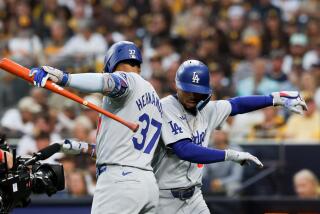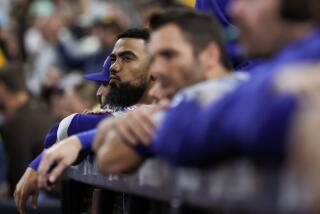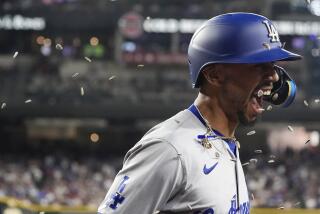Dodgers Lose, Still Thankful : Anderson, Guerrero Injuries Not Serious
CINCINNATI — The Dodgers did not win Tuesday night’s game here, but they survived it. There is something to be said for that, since they appeared headed for self-destruction against the Cincinnati Reds.
A 10-4 loss to the Reds before a crowd of 23,593 on a rainy night at Riverfront Stadium was not easy for the Dodgers to take, but they did take solace in the fact that things could have been much worse.
Shortstop Dave Anderson could have fractured his throwing hand on that second-inning freak second base collision with the helmet of Red baserunner Kurt Stillwell while trying to complete a double play with a throw to first.
After X-rays, it was determined Anderson suffered only a contusion and abrasion.
Left fielder Pedro Guerrero could have lost face--or reinjured his previously torn up left knee--on a freakier play in the third when he lost a line drive in the lights and ducked for cover.
Luckily, for the Dodgers, the ball struck Guerrero just above the left knee cap. He limped around left field for a few innings but was not seriously hurt.
“I’m just glad I didn’t get hit in the face, that all,” Guerrero said.
Added a subdued Lasorda: “At first, it looked like Anderson was hurt real bad, and it looked like Pete got hit in the knee. So, we were fortunate there.”
As it was, though, there were plenty of other Dodger casualties in this six-run loss, which dropped the Dodgers 8 1/2 games behind the National League West leading Reds.
Starter Tim Leary and beleaguered reliever/former starter Rick Honeycutt suffered from another bout of swollen earned-run averages, and many other Dodgers incured bruised egos after winning seven of their previous nine games and reviving hope of contending in the West.
Among those slumped in defeat in the Dodger clubhouse was Mariano Duncan, who had two throwing errors in his first game back from the minor leagues. Duncan replaced the injured Anderson at shortstop in the second inning.
There were a few bright spots amid the rain and gloom here Tuesday, which delayed the start of the game for 1 hour 23 minutes.
John Shelby hit two bases-empty home runs for the second time this season, accounting for half the Dodgers’ run production against starter Guy Hoffman and the Reds’ bullpen. Shelby has 15 home runs, tied with injured Franklin Stubbs for second on the club behind Guerrero.
Meanwhile, Jeff Hamilton’s run-scoring single in the eighth inning off Rob Murphy was his first RBI of the season, a stretch spanning 65 at-bats.
“Last year, I got my first RBI in my first game, on a fly ball,” Hamilton said, smirking. “This year, it seemed like 800 at-bats.”
That the Dodgers were able to joke about this loss might be a good sign. Or it might signify that they don’t take themselves seriously. After all, the Reds seemingly don’t count the Dodgers among legitimate West contenders.
As the sometimes gruesome events of Tuesday night unfolded, Guerrero’s bungled fly ball was not a major factor in the loss. But the memory of that play lingers, if only because it typifies a night of frustration and futility for the Dodgers.
With Buddy Bell on first, Davis lined Leary’s 3-and-2 pitch to shallow left. Guerrero broke for the ball, then hesitated, then covered his face with his hands. The ball ricocheted off Guerrero’s left knee, and by the time the ball was retrieved, Bell had scored and Davis was on second with a double.
“Like I said before, I’m just glad it didn’t hit me in the face,” Guerrero said. “I saw it when he hit it, but after that, I didn’t see anything. It could have been worse.”
That was also what Anderson said about his injury. Anderson had forced Stillwell at second and was in his throwing motion to first when Stillwell stood up after sliding. His helmet struck Anderson’s right hand, just below the knuckle on his fourth finger.
“When I hit it, I thought it was broken,” he said. “I’m glad it wasn’t. I don’t want to go through that again. I was out nine weeks after breaking my little finger last year. So, it turned out good.”
The same could not be said for the first two Dodger pitchers.
Both Leary and Honeycutt gave up home runs to Red catcher Bo Diaz, who, counting his ninth-inning blast Monday night against Orel Hershiser, had hit three home runs in five at-bats against Dodger pitching.
Although Leary struggled, he still left with the Dodgers trailing only 4-1 in the fourth inning. The Dodgers cut the margin to 4-2 on Shelby’s first home run of the night, but the disintegration of Honeycutt was forthcoming.
Honeycutt gave up six runs in the fifth, including Diaz’s second home run, this one a three-run shot to left field.
Another reason why Lasorda chose Honeycutt Tuesday might have been because of the attrition of his bullpen. Ken Howell left the team Tuesday to attend his grandmother’s funeral, and Brad Havens was out with a strained rib-cage muscle. So, the options were limited.
Leary did not fare well, but he did considerably better than Honeycutt.
Leary, making his first start since July 11, was in trouble in all three innings he pitched. He got out of a jam in the first inning but gave up a home run to Diaz in the second, then Davis’ bizarre run-scoring double and Paul O’Neill’s two-run home run.
Lasorda then went to Honeycutt, who had pitched two scoreless innings since being banished to the bullpen, before the game was out of reach.
Two innings later, Honeycutt had achieved that. He pitched an uneventful fourth inning but fell apart in the fifth.
The nightmare began when Honeycutt walked leadoff batter Eric Davis. One out later, Honeycutt had walked pinch-hitter Tracy Jones. Then Diaz belted Honeycutt’s 0-and-1 pitch over the left-field fence for his second home run of the game.
Honeycutt’s troubles had just begun, though. Shaken by Diaz’s three-run home run, Honeycutt then walked Nick Esasky. Stillwell followed with a double down the left-field line, Esasky scoring. Hoffman then stuck out his bat and doubled to right, scoring Stillwell.
Honeycutt looked to the Dodger dugout after that hit, perhaps wondering why Lasorda had not had yanked him. The Dodgers, in fact, did not even send a reliever to warm up until Hoffman’s hit, because of Havens’ injury and Howell’s absence.
So, it was up to Honeycutt to push on, at least until the end of the inning. It looked as though he had settled down when he forced Barry Larkin to ground out, Hoffman taking third on the play. But Buddy Bell responded with an RBI single to left.
When the long fifth inning finally ended, the Dodgers trailed, 10-2. And since Shelby only figured to have two or three more at-bats, the Reds’ lead appeared insurmountable.
“You know,” Anderson said. “That’s the way it goes for us lately. We either win or get blown out.”
More to Read
Are you a true-blue fan?
Get our Dodgers Dugout newsletter for insights, news and much more.
You may occasionally receive promotional content from the Los Angeles Times.







